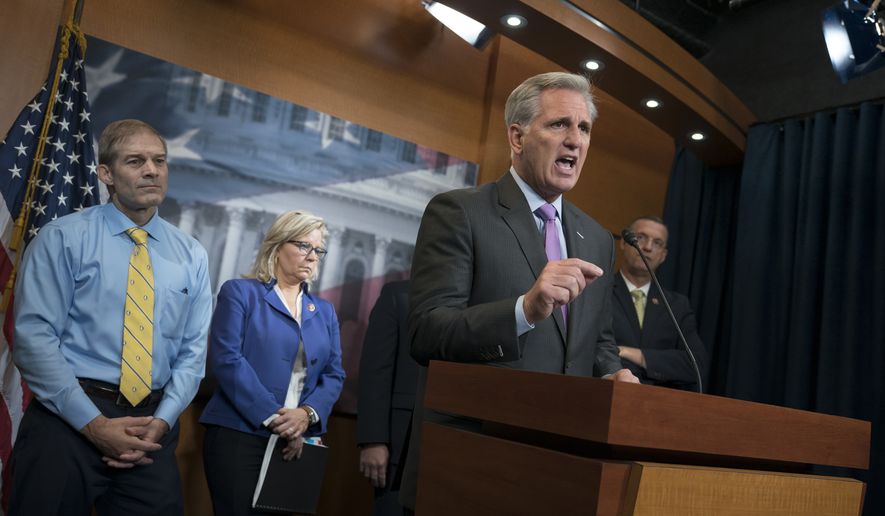House Republican leader Kevin McCarthy and two other Republicans are asking the intelligence community inspector general whether his office changed the official whistleblower complaint form to enable the allegations filed against President Trump.
The three say in a letter Monday that until recently the rules required that the whistleblower have firsthand knowledge of the alleged offense. But in recent days or weeks, the form for an “urgent concern” complaint was changed to allow for hearsay.
Virtually every sentence in the nine-page anti-Trump complaint to Congress is from secondhand sources, some of whom the whistleblower describes as White House officials and news media reports.
“Curiously, the urgent disclosure form that now appears on the Office of the Director of National Intelligence website has recently changed and no longer contains this explicit first-hand information requirement,” said Mr. McCarthy of California in the letter to intelligence IG Michael K. Atkinson.
“The timing of the removal of the first-hand information requirement raises questions about potential connections to this whistleblower’s complaint.”
The letter was also signed by Rep. Devin Nunes of California, top Republican on the House Permanent Select Committee on Intelligence, and Rep. Jim Jordan of Ohio, the top Republican on the House Oversight and Reform Committee.
DOCUMENT: Read Rep. McCarthy's letter to the intelligence community's inspector general
“This timing, along with numerous apparent leaks of classified information about the contents of this complaint, also raise questions about potential criminality in the handling of these matters,” the letter said.
Mark Zaid, who is on the whistleblower’s defense team, tweeted that the intelligence community has never strictly forbid secondhand information.
“There has never been any requirement that whistleblowers were required to possess first-hand knowledge to file complaint. No law anywhere states that,” Mr. Zaid tweeted.
Later Monday, Mr. Atkinson released a statement seeking to clarify whistleblower requirements.
The statement said the no-hearsay rule existed until May 2018. But the regulation did not in practice mean a complaint could not contain secondhand information because federal law does not ban it.
In June, the inspector general’s Center for Protected Disclosures developed three new forms, which includes the current one used by the Trump antagonist.
“Consistent with the law, the new forms do not require whistleblowers to possess first-hand information in order to file a complaint or information with respect to an urgent concern,” the IG statement said.
“In the process of reviewing and clarifying those forms, and in response to recent press inquiries regarding the instant whistleblower complaint, the ICIG understood that certain language in those forms and, more specifically, the informational materials accompanying the forms, could be read — incorrectly — as suggesting that whistleblowers must possess first-hand information in order to file an urgent concern complaint with the congressional intelligence committees.”
The whistleblower’s major charge is that Mr. Trump, during a July 25 phone call with Ukrainian President Volodymyr Zelensky, pressured the Ukrainian to investigate former Vice President Joseph R. Biden, a Democrat presidential front-runner. A released transcript shows Mr. Trump asked him to speak with Attorney General William Barr, though such a contact apparently never took place.
Democrats are pursuing impeachment based on the complaint, saying Mr. Trump was seeking foreign interference in the 2020 election. Trump backers say the transcript shows no pressure, just a request.
Until recently intelligence community IG rules stated, in all capital letters, that, “FIRST-HAND INFORMATION REQUIRED.”
The rule states, “In order to find an urgent concern ’credible,’ the ICIG must be in possession of reliable, first-hand information. The ICIG cannot transmit information via the ICWPA [whistleblower law] based on an employee’s second-hand knowledge of wrongdoing.”
That rule would appear to have stopped the Trump whistleblower.
But the current form, “Disclosure of Urgent Concern Form,” allows for both “direct and personal knowledge” or “I heard about it from others.”
While, the inspector general says the new form was developed in June, the three Republicans say the document was created Sept. 24, a month after the Trump whistleblower, believed to be a CIA analyst, sent his complaint to Congress.
“When this revised form was published, and whether the whistleblower received a copy of this form when making the disclosure on August 12, 2019, are both unknown to the House Intelligence Committee,” the Republican letter says.
The letter demands that Mr. Atkinson retain and provide all records connected to the form and how it was changed.
Mr. Atkinson butted heads with the Justice Department when he ruled the complaint was “credible” — a legal requirement.
The Justice Department ruled it was not because the target, Mr. Trump, is not an intelligence community employee, as the rules still require.
“The ICIG should view this letter as a preservation order for all documents and communications from your office related to the matters discussed herein,” the GOP letter said.
The Federalist news site first reported on the form’s new hearsay policy.
• Rowan Scarborough can be reached at rscarborough@washingtontimes.com.




Please read our comment policy before commenting.